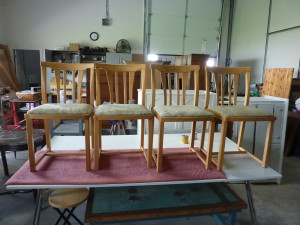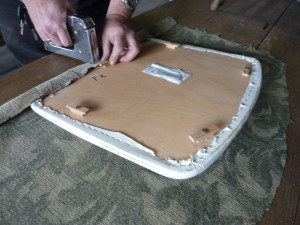The Furniture Bank is a tremendous social enterprise, with its Etobicoke location the largest office of its kind in North America. Working with social services and shelters across the GTA, the organization provides an often-overlooked leg-up to people in need. Catering to individuals and families with refugee status, escaping abusive relationships, and transitioning from homelessness, the Furniture Bank works tirelessly to help them meet their basic material needs.
Furnishing a new home is costly and laborious. The process often overwhelms families in transition, negating the joyous aspects of their improved situation. The Furniture Bank is, “very much about giving opportunities to people who had none,” explains executive director Dan Kershaw after a tour of their office and showroom. “Living is unique and special,” he adds, expressing a sentiment mirrored in the vast assortment of furniture and appliances arranged on the showroom floor. “That’s something that’s been important since the beginning.”
The warehouse that houses the office and showroom is flanked by rows of moving trucks. These vehicles are where the process starts and ends; drivers’ pick up gently used donations around the GTA for a fee and eventually deliver them to their new homes. Once inside the warehouse, the furniture is processed into usable and damaged pieces.
Over five million pounds of furniture will pass through this location. The Furniture Bank does its best to recycle all donations, redistributing four million of those pounds to homes in need and diverting them away from the landfill. The usable pieces are arranged in the showroom, an overwhelming space packed with a maze of housewares – from teacups to televisions. Volunteers help families through the “shopping” process, which is difficult for many people who have never been offered such choices before. The damaged furnishings are carted to the rear of the building which has recently begun to take on a greater role.
You see, beyond their main mission of providing furniture to families in need, the Furniture Bank is constantly evolving. Thanks to a recent grant from the Trillium Foundation, they’ve re-developed a workshop program that trains participants in furniture repair, upholstery and woodworking.
The program provides practical skills to those who could benefit most. Paul Ferrar, director of programs and partnerships, discusses the complimentary nature of the workshop and the social enterprise initiatives. “It definitely has a long-term place here,” he affirms. The workshop started as a way to decrease waste by re-purposing slightly damaged furniture that arrives as donations. “People who use the furniture removal service don’t always have the same definition of gently used,” Kershaw laments of the incoming donations. “We do repairs on furniture that normally would be put into the landfill. It could be the joints of tables have seen better days, the fabric has small rips and tears, or two damaged pieces may be re-purposed into one. We try to improve upon the furniture and get it into the charitable stream.”
The workshop has succeeded in recycling and repairing items that can then be used by clients in need. But there’s another benefit of the program: education. “There’s been interest by employment agencies, and we’ve been keen to get marginalized youth involved” explains Ferrar. The workshop doubles as a classroom teaching refurbishing and upholstery skills to young people and immigrants who may not have other viable options to learn a trade. Picking up a craft and learning to work with tools is just a small step towards positive life changes for many of the students beginning to flock to the workshop. “It has potential to grow and be its own entity within the charity, capable of contributing positively both economically and socially.”
The Furniture Bank is a vastly successful multi-faceted social enterprise founded on the principle of dignity. “People cannot make the shift to home ownership without furniture; we’re providing people a sense of worth and possibility, dignity is important,” Kershaw passionately states in reference to the 20,000 people living without furniture in Canada. “If the problem exists we are here to provide that service, get furniture to them, and get them up off the floor.”
SEE Change intern Samantha Scalise is currently living in Montreal studying international development studies at McGill University. Focusing on culture and society she hopes to use her degree to promote positive social change locally and globally



